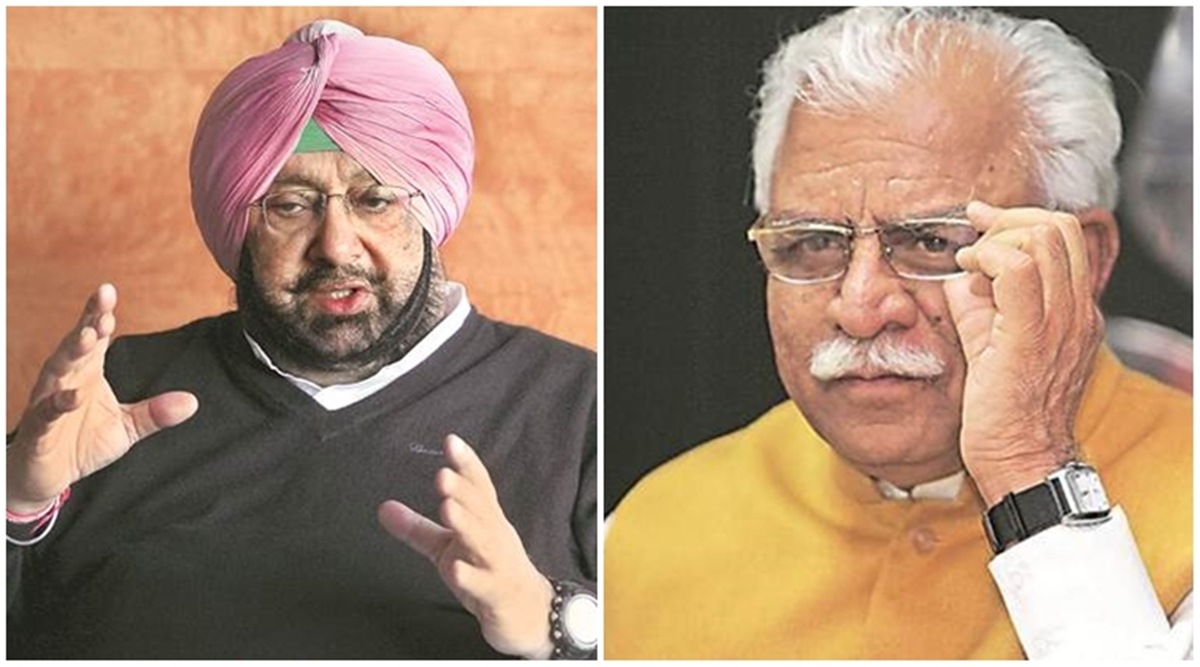 Punjab Chief Minister Amarinder Singh and his Haryana counterpart Manohar Lal Khattar. (File)
Punjab Chief Minister Amarinder Singh and his Haryana counterpart Manohar Lal Khattar. (File)Punjab will burn if it is asked to share water with Haryana and the issue has the potential to “disturb nation’s security”, Chief Minister Capt Amarinder Singh told the Centre Tuesday as he opposed the Sutlej-Yamuna Link (SYL) canal project and staked claim to Yamuna’s waters.
At a meeting with his Haryana counterpart Manohar Lal Khattar and Union Jal Shakti Minister Gajendra Singh Shekhawat, Amarinder termed the SYL canal as “an emotive issue” and reiterated the need for a tribunal to make a fresh time-bound assessment of the river water availability, even as he sought complete share of water for Punjab from the total resource available, including that from River Yamuna.
“You have to look at the issue from the national security perspective. If you decide to go ahead with SYL, Punjab will burn and it will become a national problem, with Haryana and Rajasthan also suffering the impact,” Amarinder told Shekhawat during the virtual meeting.

The meeting was convened on the directions of the Supreme Court, which asked the Centre on July 28 to mediate between the two states on the decades-old issue. Both states stuck to their stands at the meeting, but the two CMs also described the interaction – the first such meeting between them on the SYL project – as “cordial” and agreed to talk again.
?? ??????? ?? ??????????? @mlkhattar ?? ?? ??? ???? ???????? ??? ????? ?? ??????????? @capt_amarinder ?? ?? ??? ?????? ????????????? ?? ?????? ?? ????? ????? ???? (SYL) ?? ???????? ???????? ?? ???? ??????? ?????? ????? ??? pic.twitter.com/bh96M7c0gP
— Gajendra Singh Shekhawat (@gssjodhpur) August 18, 2020
Khattar hoped for an amicable solution to the dispute. “We maintained our stand that the SYL should be constructed. The Supreme Court too has said that,” he told reporters after the meeting.
SYL has been a contentious issue between the two states with the Punjab portion of the canal still incomplete. The construction began in 1982.
Shekhawat, who joined the video conference from Delhi, was “of the view that carriers could be constructed and SYL canal could also be completed and kept ready while discussions on water sharing continue and the final formula could be decided later.”
Since the completion of SYL is also a contentious issue in Punjab, sources said Amarinder categorically refused to agree to Shekhawat’s proposal and linked the debate with national security and invoked Pakistan.
“Punjab remains at risk from all ends,” a government statement quoting Amarinder said. The Punjab CM said Pakistan was continuing with attempts to foment trouble and was trying to revive the separatist movement through the banned Sikhs for Justice (SFJ) organisation. “The water issue could further destabilise the state.”
“Punjab had a right to Yamuna water, in which it did not get a share at the time of 60:40 division of assets with Haryana during the state’s bifurcation in 1966,” Amarinder said, even as he expressed his willingness to sit across the table with his Haryana counterpart to discuss the `emotive’ issue. He also suggested that Rajasthan be involved in discussions on the SYL canal and Ravi-Beas waters issue as it was also a stakeholder.
Amarinder said it was necessary to set up a tribunal for fair adjudication of the water availability, and pointed out that the water sharing proposed by Eradi Commission was 40 years old, while international norms require a review every 25 years to ascertain the status.
Noting that there had been no adjudication or scientific assessment of available Punjab river waters till date, Amarinder said that the Bhakra Beas Management Board (BBMB) had reported that availability of Ravi-Beas water had come down from the estimated 17.17 MAF in 1981 to 13.38 MAF in 2013. Despite being a non-basin state and having a smaller population as well as lesser cultivated land area, Haryana’s total availability of river water stood at 12.48 MAF as against Punjab’s 12.42 MAF, he noted. He pointed out that trans-basin transfer of water can only be allowed from a surplus basis to a deficit basis, and, as of today, Punjab is a deficit state and could not therefore be asked to transfer water to Haryana.
Recalling his government’s decision to terminate all water agreements in 2004, Amarinder said this was a “concerted decision” to “save Punjab from burning, amid reports that violence could erupt in the state in protest.”
The situation had aggravated since then, he said, adding that 109 of the state’s 128 blocks had officially been declared `dark zones’. Pointing to the melting glaciers, he urged the central government to take the climate change effects into account. The situation was likely to worsen with China constructing dams in their territory, he warned adding that this would lead to water shortage even in Sutlej river.
“Why would I not agree to give water if we had it,” he said.
Khattar, meanwhile, hoped for an amicable solution to the dispute. “We maintained our stand that the SYL should be constructed. The Supreme Court too has said that,” he told reporters after the meeting.
SYL has been a contentious issue between the two states with the Punjab portion of the canal still incomplete. The construction began in 1982.
Shekhawat later said that Punjab and Haryana CMs placed their viewpoints.. “At the next meeting, talks will be held from the point where we ended them today and whatever the outcome, we will apprise the Supreme Court about it,” he said.